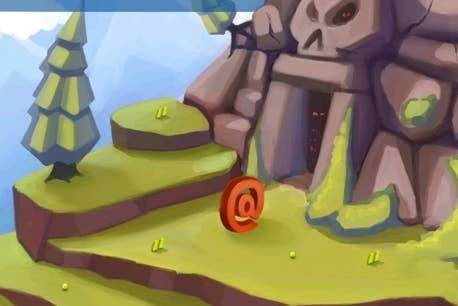Where I'm @: A Brief Look At The Resurgence of Roguelikes
How a single ASCII RPG spawned a generation of brutal classics
I hate roguelikes. They crush me, burn me, drop me in acid and sneak up to stab me in the back. They curse me, break me and mock the very concept of fairness. They kill me. Every. Single. Time.
I've been playing them for years, and there are some, like ADOM, which I've dedicated hundreds of hours to, but I've only beaten one: Fusion Reactions' 100 Rogues - a neat and streamlined graphical roguelike on iOS. Because I never finish any of them in anything even approaching a satisfying manner, I've always got at least two or three on the go - disparate dungeoneers linked only by the origins of their digital diaspora.
"Part of the reason Dwarf Fortress can include a breadth of mechanics unseen in other games is because complex mechanics are expressed in the most simple of visual forms."
Justin Ma, FTL developer, on ascii graphics.
Their shared parentage fascinates me. That single game, Rogue itself, has spawned so much - a genre of its own - that it should be venerated as one of gaming's pantheon. Yet, it remains a curiosity to most, its depths unplumbed and mysteries unsolved - a weird smattering of ascii characters moving at a snail's pace. As I've discovered at other jobs where I wasn't allowed to play games, a classic roguelike can even pass as a spreadsheet when viewed over your shoulder at a distance by an uneducated superior.
Of course, Rogue itself owes a debt to its ancestors, notably the D&D ruleset which so closely informed its bestiary and inventory, but also other digital pioneers like the gloriously naively named Adventure and Dungeon. However, whilst they laid foundations, it's Rogue which formed the first fruiting bud on this venerable branch of videogames - it's Rogue's name which is still the identifier for this curiously diverse yet contained set of parameters.
The last few years have been something of an Indian summer for the genre. There have been Roguelikes in various states of development since day one, of course, but until recently mainstream success was elusive, and even now the more recognisable examples are still distinctly niche. But they're putting their heads increasingly further above the parapet.
Take Dungeons of Dredmor, for example, a graphical (as opposed to ascii-based) dungeon delver - full of humour and blessed with a usable UI - which nonetheless manages to engage with the core tenets of the genre most successfully. It's nowhere near as complex as some of the more obscure offerings, but retains a depth which many RPGs choose to eschew. It's a fine balance between authenticity and approachability, but why did developer Gaslamp Games choose to take aim at such a core target?
"The key elements of roguelikes are so enduring because it feels good to explore and invest in a character that grows and progresses," Gaslamp Games' CCO David Baumgart tells me. "The deadly precariousness inherent to the unknown environments of roguelikes gives that investment a great deal of meaning. A small risk of losing everything makes every move exciting."
It's a good point, and exactly the sort of risk/reward ratio which gives rise to the sort of love/hate concomitance which pervades my experience with the genre. Roguelikes thrive on a certain level of unpredictability and brutality, throwing in the sort of "out of depth" enemies or sudden and unpredictably massive explosions which mean that countless hours of meticulous planning can be scuppered by the slightest error.
Justin Ma is one of the lead developers of FTL, a sci-fi ship combat simulator which defies categorisation but can loosely be folded in with 'roguelike-likes'. FTL is very much pivoted around this ever-increasing sense of panic and desperation, this awareness of impending and unavoidable doom - largely fuelled by a permadeath mechanic and random encounters which leave you constantly in trepidation.
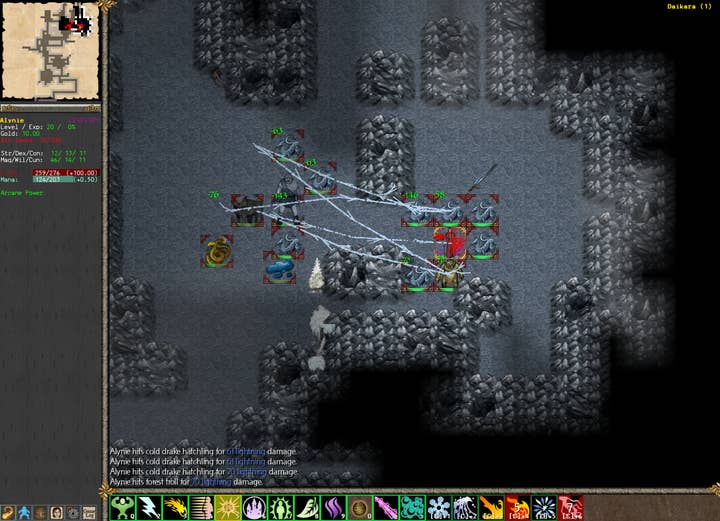
"I think at heart they force you to care about your character," Ma offers, when I ask him about the appeal of the genre. "Maybe not the same way one would care about Nathan Drake, but you definitely feel responsible for well-being of the person (or in our case, ship). This makes your successes and failures all the more compelling."
For some, the appeal is more practical. Joshua Day, who works on the traditional but accessible Brogue, sees it as a chance to create a game with a scope well beyond what you might expect from a smaller team.
"These games create compelling experiences without demanding large teams and complex coordination. Roguelikes are constrained by the need to present the player with everything they have to offer at all times - if you really want to improve a roguelike in one particular situation, you're going to end up making it better generally. Non-modal, non-narrative play sounds kind of weird when you first come into it, but as a hairshirt exercise it works brilliantly for keeping the focus on the here and now."
ADOM's Thomas Biskup, who like many roguelike developers, works pretty much alone on his project, agrees that the genre enables more ambitious development, arguing that opting for an ascii interface brings a focus to gameplay over graphics.
"I can only offer my personal opinion," he half-jokes: "Lack of graphical talent combined with the huge amount of satisfaction gained by creating an immersive and intense game world - in contrast to the tedium of fiddling with pixels!
"It's so much fun not having to worry about pixels and instead being able to focus on the game, content and story that ASCII is a natural for me. Combined with the fact that ASCII graphics do not really seem to lessen the enjoyment of the game in any way compared to commercial graphics-intense games (probably due to the fact that the human mind is the most capable image processor out there and your imagination turns ASCII into whatever imagery you need) there is no real incentive to spend months and years on graphics when you instead can work on the story and content."
"I guess that many people interested in compelling game concepts are getting more and more tired of the shallow and boring commercial games that get put on the shelf by the big commercial companies. I could count at least a dozen fantastic game concepts from C64 times that lack any challenger in modern times...which really is tragic. Game companies usually seem to be so focused on 3D graphics these days that the most basic rules of enjoyable game design get totally ignored. I find it really tragic that modern computing power does not get used a lot more on complex and interesting game worlds instead getting kind of wasted on graphical effects that bore you after a couple of hours. There are so few brilliant exceptions that it really drives me crazy."
"There are as many reasons as there are developers," says Brogue's Joshua Day, "but I think most of them amount to a renunciation of the marketing message that what we couldn't do last year is the only thing worth doing. ASCII games were fun when people first made them and they're still fun now.
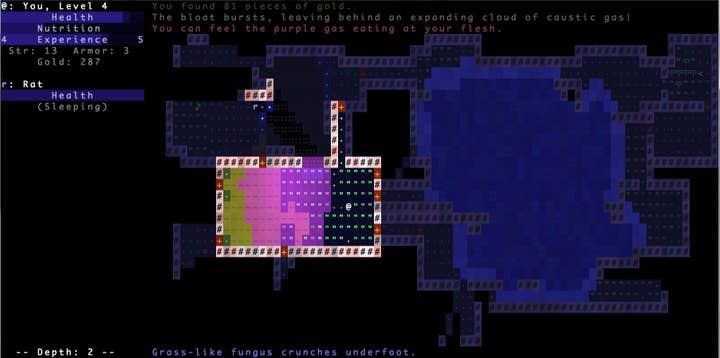
"Nothing changes but expectations, and expectations are just prejudice. The experience can be more cerebral, more refined, more imaginative, more dynamic, and what have you, but with good art direction you can capture any one of those with graphics. The one thing you can't capture with graphics is the ambivalence about having graphics at all."
The bare-bones approach of the traditional roguelike certainly does focus the experience. Most don't feature much of a narrative beyond a flimsy excuse to keep heading downwards, and there's very rarely any sort of motivation other than trying not to chalk up YASD (Yet Another Stupid Death). Instead, they tend to be about the constant granular challenge of knowing how to manage that all important risk reward. When 45 hours of gameplay can rest on whether or not an unidentified potion will kill or cure, you tend to find yourself pondering every single decision quite closely.
"Difficulty and randomness are, in my opinion, necessary to roguelikes," says Gaslamp's CCO, incidentally raising a far thornier issue which I'll come back to in a moment. "Our approach to design has been to allow people to choose their own level of difficulty because even if not given an in-game option to change difficulty, players will manipulate save files or mod the game to make it easier if they really want to. Why get in the way of that? There's no 'wrong fun', though we do suggest that playing with permadeath is the intended game experience by having it be set on by default."
Tales of Maj'Eyal, better known as ToME, is actually a little more lenient than most roguelikes, offering players the chance to earn extra lives through levelling up or achieving certain goals. When you die in ToME you can, assuming you've got a life left, resurrect where you died or back at a safe location. However, developer Nicolas Casalini still sees the toughness as a vital part of the appeal, and knows that a lot of players feel the same way.
"I yet have to see a playable roguelike on a mobile...I have yet to find one that I'd be willing to play for more than five minutes."
Dr Thomas Biskup, ADOM
"Yeah I think so," Casalini tells me. "Difficulty is always hard to judge though; it really depends on the player and since roguelikes are usually turn-based there is a fine line between hard and boring. It is, in my opinion, important to try to avoid situations where the safest thing to do is to grind/wait/search every possible spot every turn. It's not easy to do, probably impossible to completely remove: but it is a goal to strive to."
Striking that balance can be incredibly hard. I'm not overly given to fits of fury when gaming, but I've rage quit dozens of games of FTL when things have been stacking up against me, or suicide a Slash'em character when a mystery scroll turned out to be "destroy armour". Often, quite frankly, it feels like you're being cheated, even though you logically know that you're not. Joshua Day is of the opinion that if you can't take the heat, don't play near the procedurally generated lava. I asked him if he thought that the genre thrived on a macho sort of toughness, eliciting a fairly voluble reply.
"I think that most of the apparent 'elitists' are just people who love what they do and don't want to be told that it's not ok, who love a challenge, who loved it even when they were new to the game themselves, and don't want to hear that the game is too 'hard' for new players," he explained.
"It used to be that if you were playing a roguelike you had already been sold on the principle of roguelike difficulty. These days, more people are finding them who expect to beat the game in a few weeks, and to get half way through after ten tries, and that just doesn't track with the experience that people who've already been there know is more fun. It's more fun (really!) to struggle for each new dungeon level, to achieve a victory over yourself, instead of over a computer, because who cares what a computer thinks of you?"
All this is perfectly encapsulated by "losing is fun!" the community motto of Dwarf Fortress - a game of such Byzantine complexity that whole suites of attendant support software have been published by third parties to help players combat the mysteries of the UI and mechanics. DF, produced by brothers Tarn and Zach Adams, has a weird mystique about it. It's largely scoffed at by gamers, but it has an infamy which has lead to coverage as far reaching as the New York Times. It's impossible to win, infuriatingly obtuse and completely free. It's also totally brilliant.
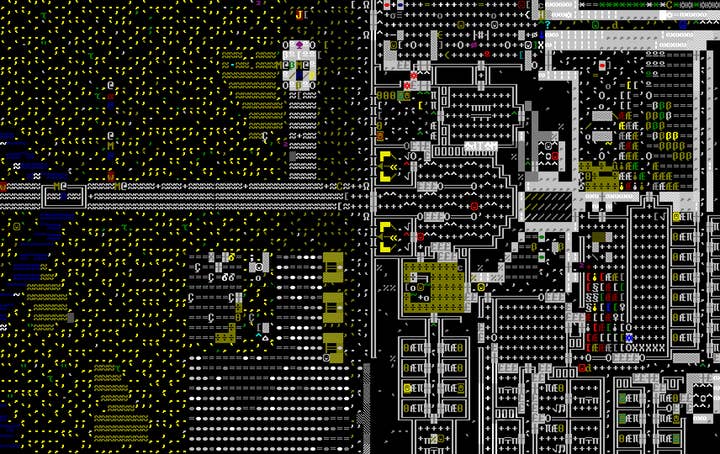
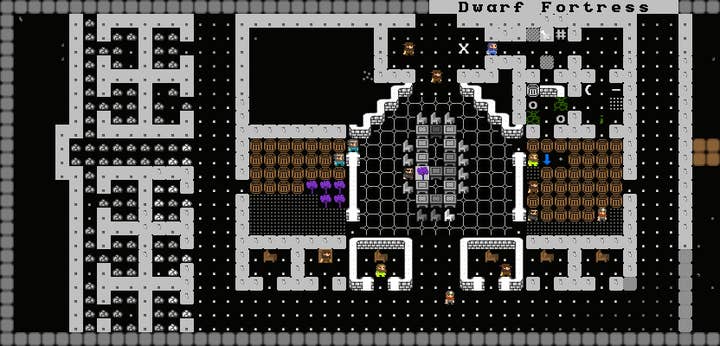

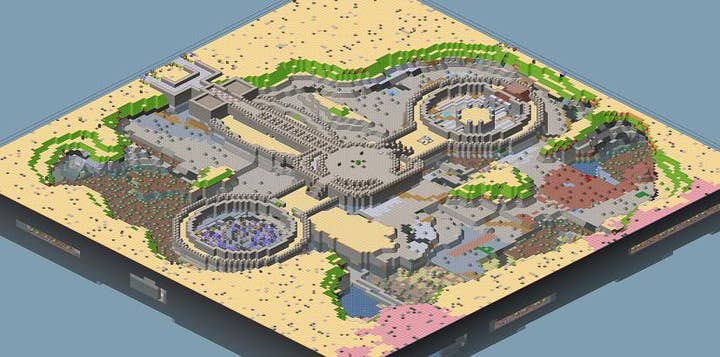
The thing is, for a lot of people - it's not a roguelike. It's an (optionally) turn-based, top-down viewed ascii-game (at least in its default build) which wipes your save when you die and treats you like a fly at a spider party. However, you control a whole colony of dwarves in an indirect management style, ordering them to build and fight rather than assuming direct control. In truth, it's not actually much like Rogue at all. Exactly what does constitute a roguelike is something of a hot topic.
"The notion that there's any actually definitive set of mechanics is absurd to me," says Baumgart. "The only definitive rules I can see are the broad definitions of the genre: permadeath and nonlinear elements, though even these rules can be bent to varying and interesting ends."
Casalini warns me that I'm likely to " find pain and death by old age," before I find any two people who will agree on a definition but argues that randomisation of maps, items and enemies is key - also going on to exclude something like Dwarf Fortress by suggesting that control should be direct and limited to "'One against all'; or maybe a small party. But it has to have a 'physical' representation of the player in the game; as opposed to RTS and such where the player is immaterial."
Dr Biskup is also keen to avoid being tied down to any particular set of factors, but identifies replayability, permadeath and content over cosmetics. Justin Ma opts for a similar set of permadeath, high difficulty and skill cap, and procedural generation. However, it's perhaps Joshua Day who encapsulates it best for me.
"The community is awesome; their enthusiasm is infectious and occasionally scary. We've been particularly blown away by the work that modders have done; they've discovered many scripting tricks that we never imagined were possible."
David Baumgart, CCO Gaslamp Games
"The unspoken definition looks a little more like this: Roguelikes are games about decision making and risk taking under the influence of hidden information. Exploration, item identification, random combat rolls, even permadeath, all serve that goal. You explore so that more that was once hidden will no longer be, and you take risks to push the frontier back.
"You find unknown items so that you have to deduce information about them and relate that to your position in the dungeon (and even in the absence of item identification, there are still random item drops, which serve the same purpose). Random combat means that you have to plan for the unexpected even when you have good information about your surroundings.
"Permadeath means that the risks you're taking really feel like risks and that you can't keep information that you've gained when you do fail. Exploration and item identification always start back at zero."
If the people making them can barely agree on what they are, and they are surrounded by layer upon layer of obfuscation and intentional mystery - how are roguelikes still being trotted out so regularly? How do they snare people like me, who normally has the attention span and patience of a tired toddler trapped in a fishbowl at Disneyland, into devoting countless hours to delving their depths, suffering defeat after ignominious defeat?
"We are digging ourselves out of a period where game development has been focused on streamlining the gameplay experience, perhaps at the cost of both challenge and a diversity and richness of experience that emerge from complexity," Baumgart tells me. "This is especially true in the AAA market where you have a lot of, in the words of Nicholas (Vining, Gaslamp's CTO), 'Press the Square Button to Leap Behind The Rock! Press the Triangle Button to Operate The Cyclops-Killing Catapult!, Press the Circle Button to shun your eldest son!', that sort of thing.
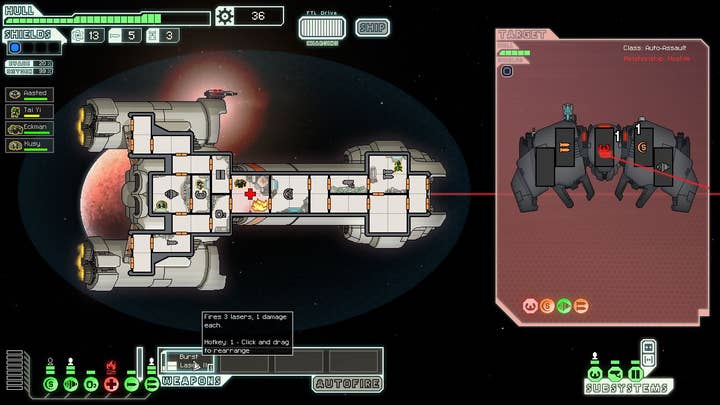
"A streamlined, linear experience is a perfectly legitimate way to make games and the advances made in user interface driven by this design sense have over the past decade lead to enormous and necessary advances which have been hugely beneficial to gameplay across the board. But there has been a growing reaction against relatively unchallenging, extremely forgiving 'media experience' style games and this is especially apparent in the indie game space which has the freedom to experiment with ideas that go against conservative, mainstream design principles - like permadeath."
Justin Ma agrees with the aversion to dumbing down, citing Spelunky as an example of a commercially successful indie title which adopted heavily from roguelike mechanics, reasoning that "There could be an increased desire for punishing games because players are fed up with with the hand-holding." For Casalini, it's been a process of reducing the barriers to player entry, improving UI (a major bugbear for the ToME creator) and making them easier to enjoy without just making them easier.
Something which does ease the suffering of learning the ropes of a new roguelike are the attendant wikis, guides and exploit lists which invariably blossom around them - usually maintained by the community of players. For all the supposed elitism of roguelikes, I've never encountered communities which are more welcoming, sharing and friendly than those surrounding these most opaque of games.
ToME is a particularly apt example - even though it's a purely single-player game, it has a running chat channel open to players around the world. You can ask stupid questions there, ask for hints rather than spoilers and even link enemies or items to the window with a neat, single-click mechanic which lets everyone see what particular shiny you just acquired or which massive slab of scaly doom just smeared you across the walls.
It works brilliantly, assuaging the frustrations and resentments which these games can quickly accrue by simply sharing your pain. It's amazing how much better you'll feel when a total stranger tells you that the beserker troll who just picked you up and smashed you into jelly was "a nasty piece of work." It's comforting, a pat on the back from the ether which lets you pick up and start again.
"Sad or not; nowadays players do not expect to spend five hours learning a terrible UI to be able to play. Since there are many more players than games you can not expect games to change players, so you have to change your games."
Nicolas Casalini, developer, ToME.
"I can see the appeal in hidden things but I do not believe in it," Casalini tells me when I ask about ToME's community. "This worked in the past because it was harder to find spoilers; but in this day and age if a game is big enough there will be a wiki, spoiler or forum about it and it will list every little detail.
"Communities around RLs are important because it lets the developer(s) know their game is liked. Games are like art; to improve at it we need critics. Players are those critics. It feels good when a player tells you your game is fun, but it also feels good when a player tells you 'oh this could be improved' because it means they care. I urge all developers to care to their community, be nice to them and they'll be nice to you!"
Thomas Biskup is even more ebullient in his feelings on roguelike communities.
"As far as ADOM and ADOM II go, the community probably is the most important factor out there. Roguelike gamers usually are highly creative, imaginative and intelligent people (from my experience) with tons of fantastic ideas. Growing such a community, listening to their ideas, filtering those ideas and hammering them into a shape that fits your personal vision for the development of your game probably is the most important non-technical ability for a roguelike developer. I immensely enjoy that process and am highly indebted and grateful to the ADOM community for so many years of great feedback. Without them neither ADOM nor ADOM II would be what they are.


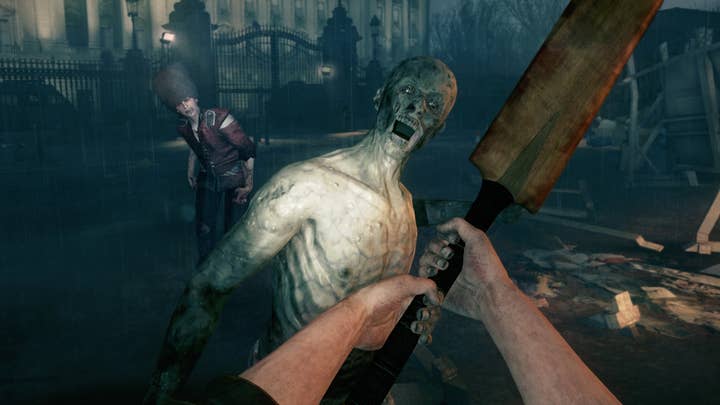

"Whether the mechanics of a specific game are mostly hidden (as for ADOM and ADOM II) or a lot more obvious and open (as for many other rogue likes) does not seem to matter much in the long run according to my experience. I even would go so far to say that hiding some of the mechanics actually helps as folks tend to focus a lot more on how well an implementation plays and feels instead of the nitpicky details of the technical implementation."
The influence of roguelikes and their mechanics is undoubtedly spreading, reflecting the growing need for games which punish mercilessly. Look at the success of Dredmor, FTL and Spelunky for a start, but also cast your eye over Dark Souls, DayZ, X-Com, Diablo's hardcore mode and even ZombiU. Commercial success is finally coming around for a genre which has, for most of its history, largely been given away for free. But does it have a future, in its purest form, away from the PC?
Doubtless, the complexity makes it difficult. Not having a keyboard either vastly reduces your control options or forces unwieldy UI - just take a look at any of the iOS versions of Nethack, Rogue or their tougher cousin Slash'em for evidence of that. It's unlikely that we're ever going to see a game which successfully incorporates the sort of command list which includes separate buttons to clean your ears and face, scratch words into the dust with wands, rub objects against each other or dip things into potions without the faithful keyboard.
But perhaps this is no bad thing. Let the commercially successful games keep coming, streamlining the core experience and bringing the concepts to a wider audience - there will still always be the darker depths of Dwarf Fortress and ADOM to retreat to if you're allergic to popularity.
I will keep going back to them, these ancient and intermittently maintained hobby projects with their wilful middle finger to the casual passer by. I will continue to be crushed, burned, cursed, exploded and ganked by invisible stalkers. I will still run around the nearest corner at the mere sight of a capital D - just in case it's a massively out-of-depth ancient chromatic dragon. I'll keep suffering. I'll keep dying. Because I love roguelikes. It's where I'm @.
